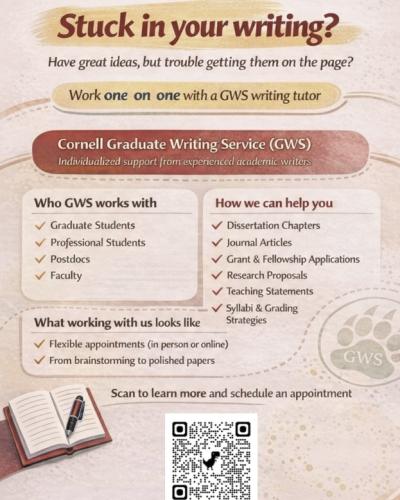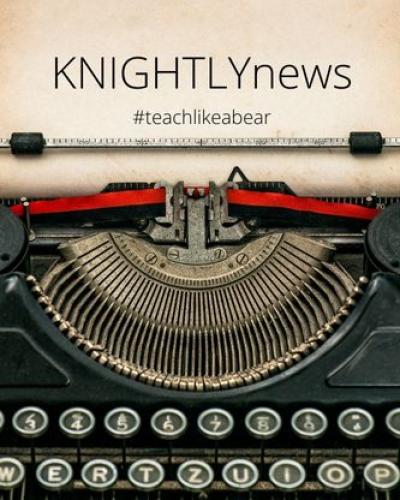The KNIGHTLYnews is an online forum where FWS instructors and other teachers of writing can swap and share ideas for best classroom practice. Weekly posts are designed to help teachers develop lesson plans and writing assignments, and respond to classroom challenges by introducing new teaching tools and sharing emerging pedagogical ideas. Posts also direct readers to program and campus resources that support teaching and learning, and provide opportunities for peer collaboration and mentorship. #teachlikeabear
When I help FWS students get ready to write (or finish writing) research papers, I encourage them to explore multiple and various opportunities to fill in research gaps. Some of these strategies include:
- seeking feedback from others (classmates, peers, tutors, librarians, faculty, those with both little and much experience with research and/or their topic)
- continued independent research with more and less specific search terms and/or in different research platforms and interfaces
- reading more deeply into a topic and its adjacent areas of inquiry
A new strategy – perhaps controversial – is to use generative AI tools like ChatGPT.
Last week, FWS students and I spent time in class and in conferences trying out a few ideas. Here is what we learned:
What We Did
We prompted ChatGPT to compose drafts of research-based essays.
Examples:
-
write a 2000 word academic essay on grass fed beef and sustainability
-
write a 2000 word essay debating grass fed and grain fed beef using 3 direct quotations
-
write a 2000 word essay arguing for sustainably sourced beef citing 5 peer reviewed sources
What We Learned
The writing ChatGPT produced was simplistic, repetitive, and generally lacked voice/style/creativity/analysis. The prose disregarded many of the best practices for sentence- and paragraph-level choices we have been trying out and workshopping all semester. The content was sometimes inaccurate, occasionally significantly so; more often, though, errors were minor enough that they were likely only detectable to someone with prior knowledge. The ChatGPT draft did, however, lead us to ideas about what to research in much the same way a Wikipedia entry might, and we found that feature quite appealing.
What We Did
We used ChatGPT to create outlines for research-based essays.
Examples:
-
write an outline for an academic essay on grass fed beef and sustainability
-
write an outline for an essay debating grass fed and grain fed beef using 3 direct quotations
-
write an outline for an essay arguing for sustainably sourced beef citing 5 peer reviewed sources
What We Learned
The organizational structures that ChatGPT generated were pretty impressive, especially when we were very precise in crafting the prompt. Prompts that were too general made us feel like we would lose control of the research. Those that were too specific made us feel like we would lose control of the writing. With the right prompts, though, we were able to use the regenerate option to produce a series of outlining variations. We found the process of scrolling through multiple options to be a potentially useful way to start conceptualizing a draft and/or to imagine how a typical reader might be inclined to experience a project.
What We Did
We used ChatGPT to explain specific questions to fill gaps in research results.
Examples:
-
what does beef have to do with sustainability?
-
what are the arguments against grass fed beef?
-
what are emerging technologies in beef production?
What We Learned
ChatGPT answered our questions in much the same ways that Google does, but rather than receiving a list of websites to peruse as was the case when we used Google, ChatGPT compiled responses from multiple websites to create a single response. As we read the single response, we wondered where the information came from, how it was selected, and why it was presented as it was. The response to our question seemed to generate more questions than it answered, and yet, we still found the strategy useful. Relying solely or too heavily on this research strategy is risky, to say the least, but results could lead to reliable sources by helping researchers formulate and refine ideas about how to make sense of academic topics of inquiry and what to research when using conventional research platforms.
What We Did
We used ChatGPT to track down sources.
Examples:
-
find 5 sources on grass fed beef and sustainability
-
find 5 peer reviewed sources debating grass fed and grain fed beef
-
find 5 data-driven studies on the environmental impact of grain fed beef for sustainably sourced beef citing 5 peer reviewed sources
What We Learned
ChatGPT surprised us. It was a pretty good research assistant, especially when we were very clear about the kinds of sources we were looking for. The platform found some sources that we had already located using conventional methods, and it provided brief summaries of each source. We agreed that ChatGPT cannot replace those conventional methods for locating sources, particularly scholarly ones -- Cornell Libraries, Google Scholar, or advanced Google or Duck Duck Go search engines -- but ChatGPT can be just one more platform that researchers put to use to help track down relevant and generative source materials.
November 2023 Update --> The free version of ChatGPT no longer produces the kinds of results described above. When recently prompted to find sources, the AI bot made up sources -- fake titles, fake journals, fake publication details. Interestingly, however, the AI bot did sometimes lead us towards promising results. When we searched the CU Library, Google, Scholar, or Google for the fake sources, for instance, we found some pretty good real sources with similar titles. The AI bot also produced the names of legitimate authors and researchers working in areas of interest. We also found that when using the paid version of ChatGPT, we were able locate legitimate sources, though the summaries ChatGPT created were too general to be very helpful.




